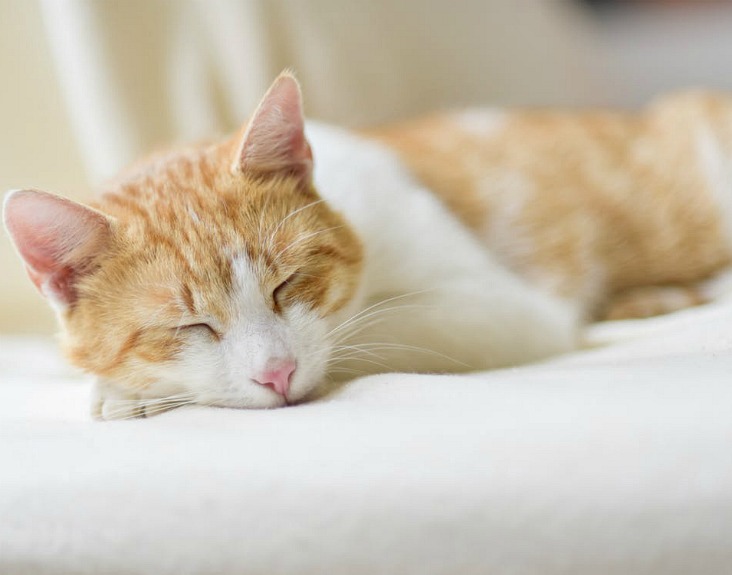Cats are pretty self-sufficient critters, but they can still use a little help in staying safe — and you can probably use a little help in saving time and money on repairs. Let’s discuss some ideas on how to create a safe and cozy apartment for you and your tabby.

Paste this Image on Your Site!
Simply copy and paste the code below and you can share this infographic on your site:
[fdembed]
Keeping Your Jellicle Jumper Inside the Apartment
Cats can suffer from something called High-Rise Syndrome, which is the phenomenon of cats falling from two stories or higher. The falls usually occur when the cat falls asleep or gets distracted by a bird or other animal. There’s an interesting reaction-time factor in that cats that fall from seven stories or higher have the highest survival rate because they have time to adjust their bodies for impact. Injuries often include a broken jaw, shattered teeth, broken legs and internal injuries. But the good news is there is a 90% survival rate for cats that receive immediate and proper medical attention.
With a little precaution, you can keep your kitty safe inside. Make sure window screens are snug and secure using zinc window screen clips. For sliding glass doors, lay a dowel in the track to make the opening smaller than your cat’s head. For windows that have the option of opening from the top or bottom, open only from the top. Finally, you can check with your property manager about creating a cat coop or “catio” by enclosing your balcony from floor to ceiling with reinforced chicken wire.
Cat Jumping Facts:
1. Some cats have thumbs — or it looks like they have thumbs; it’s actually an extra toe. Polydactyl cats, as they’re called, were loved by Ernest Hemingway.
2. A cat can jump five times its own height in a single bound.
3. “Cat righting reflex” is a term used to explain a cat’s innate ability to orient itself as it falls in order to land on its feet.
Stopping Your Little Edward Scissorpaws From Making the Couch His Masterpiece
You can’t (and shouldn’t) stop your cat from scratching, but it is pretty easy to redirect this necessary behavior to an acceptable (and likely less costly than your new sofa) place. Cats need to scratch for several reasons: It allows them to exercise and stretch, it helps clean and trim their claws, and it’s a way for them to scent-mark territorial area. The #1 way to help your cat scratch where he is supposed to is to get him a scratching post and place it next to the furniture. You can also apply a deterrent like
No-Scratch spray or a double-sided tape like
Sticky Paws to furniture and floorboards. Lastly, be sure to trim your cat’s nails to reduce the damage.
Cat Scratching Facts:
1. A cat has scent glands along its tail, forehead, lips, chin and the underside of its front paws.
2. Cat Scratch Fever is a real thing people can contract from a cat scratch due to the bacteria under a cat’s claws (although you can get this other places, too, such as from fishing hooks).
3. Most cats have a strong aversion to anything citrus.
A Litter Bit of Advice About Odor
Getting your cat to use the litter box or keeping the odor at bay when it does can be a challenge, but there are several ways to keep yourself and your apartment guests breathing easy.
Scoop and change your cat’s litter at least once a day, and thoroughly rinse out the box with baking soda or unscented soap once a week. Also, use less litter. Cats like a shallow bed of litter — no more than 2 inches deep and a larger litter box without the box liners or lids.
The litter box should be out of sight of your cat’s food and water dishes, and out of reach for children and other animals. The rule for multiple cats is to provide a litter box for each of your cats, plus one extra; so if you have two cats, have three litter boxes. If your cat’s bathroom habits change suddenly, there may be either a stress factor or a physical reason for this. Older, neutered male cats that stay inside seem to be more prone to cystitis; if you suspect this could be the problem, ask your vet.
Cat Litter Facts:
1. Studies show that cats timeshare territory to avoid squabbles with other felines.
2. The plastic materials in litter boxes can absorb odors that, over time, your cat can smell with its extraordinary olfactory senses.
3. George Clooney once cleaned his roommate’s cat’s litter box for four days, then went to the restroom in it himself, causing the roommate to think it was from his constipated cat.
Sources:
https://www.aspca.org/pet-care/cat-care/high-rise-syndrome
http://www.preventivevet.com/cats/high-rise-syndrome-keeping-your-pets-safe-from-falls
http://pets.webmd.com/cats/guide/solving-cat-litter-box-problems?page=2  Paste this Image on Your Site!
Simply copy and paste the code below and you can share this infographic on your site:
[fdembed]
Keeping Your Jellicle Jumper Inside the Apartment
Cats can suffer from something called High-Rise Syndrome, which is the phenomenon of cats falling from two stories or higher. The falls usually occur when the cat falls asleep or gets distracted by a bird or other animal. There’s an interesting reaction-time factor in that cats that fall from seven stories or higher have the highest survival rate because they have time to adjust their bodies for impact. Injuries often include a broken jaw, shattered teeth, broken legs and internal injuries. But the good news is there is a 90% survival rate for cats that receive immediate and proper medical attention.
With a little precaution, you can keep your kitty safe inside. Make sure window screens are snug and secure using zinc window screen clips. For sliding glass doors, lay a dowel in the track to make the opening smaller than your cat’s head. For windows that have the option of opening from the top or bottom, open only from the top. Finally, you can check with your property manager about creating a cat coop or “catio” by enclosing your balcony from floor to ceiling with reinforced chicken wire.
Cat Jumping Facts:
1. Some cats have thumbs — or it looks like they have thumbs; it’s actually an extra toe. Polydactyl cats, as they’re called, were loved by Ernest Hemingway.
2. A cat can jump five times its own height in a single bound.
3. “Cat righting reflex” is a term used to explain a cat’s innate ability to orient itself as it falls in order to land on its feet.
Stopping Your Little Edward Scissorpaws From Making the Couch His Masterpiece
You can’t (and shouldn’t) stop your cat from scratching, but it is pretty easy to redirect this necessary behavior to an acceptable (and likely less costly than your new sofa) place. Cats need to scratch for several reasons: It allows them to exercise and stretch, it helps clean and trim their claws, and it’s a way for them to scent-mark territorial area. The #1 way to help your cat scratch where he is supposed to is to get him a scratching post and place it next to the furniture. You can also apply a deterrent like No-Scratch spray or a double-sided tape like Sticky Paws to furniture and floorboards. Lastly, be sure to trim your cat’s nails to reduce the damage.
Cat Scratching Facts:
1. A cat has scent glands along its tail, forehead, lips, chin and the underside of its front paws.
2. Cat Scratch Fever is a real thing people can contract from a cat scratch due to the bacteria under a cat’s claws (although you can get this other places, too, such as from fishing hooks).
3. Most cats have a strong aversion to anything citrus.
A Litter Bit of Advice About Odor
Getting your cat to use the litter box or keeping the odor at bay when it does can be a challenge, but there are several ways to keep yourself and your apartment guests breathing easy.
Scoop and change your cat’s litter at least once a day, and thoroughly rinse out the box with baking soda or unscented soap once a week. Also, use less litter. Cats like a shallow bed of litter — no more than 2 inches deep and a larger litter box without the box liners or lids.
The litter box should be out of sight of your cat’s food and water dishes, and out of reach for children and other animals. The rule for multiple cats is to provide a litter box for each of your cats, plus one extra; so if you have two cats, have three litter boxes. If your cat’s bathroom habits change suddenly, there may be either a stress factor or a physical reason for this. Older, neutered male cats that stay inside seem to be more prone to cystitis; if you suspect this could be the problem, ask your vet.
Cat Litter Facts:
1. Studies show that cats timeshare territory to avoid squabbles with other felines.
2. The plastic materials in litter boxes can absorb odors that, over time, your cat can smell with its extraordinary olfactory senses.
3. George Clooney once cleaned his roommate’s cat’s litter box for four days, then went to the restroom in it himself, causing the roommate to think it was from his constipated cat.
Sources:
https://www.aspca.org/pet-care/cat-care/high-rise-syndrome
http://www.preventivevet.com/cats/high-rise-syndrome-keeping-your-pets-safe-from-falls
http://pets.webmd.com/cats/guide/solving-cat-litter-box-problems?page=2
Paste this Image on Your Site!
Simply copy and paste the code below and you can share this infographic on your site:
[fdembed]
Keeping Your Jellicle Jumper Inside the Apartment
Cats can suffer from something called High-Rise Syndrome, which is the phenomenon of cats falling from two stories or higher. The falls usually occur when the cat falls asleep or gets distracted by a bird or other animal. There’s an interesting reaction-time factor in that cats that fall from seven stories or higher have the highest survival rate because they have time to adjust their bodies for impact. Injuries often include a broken jaw, shattered teeth, broken legs and internal injuries. But the good news is there is a 90% survival rate for cats that receive immediate and proper medical attention.
With a little precaution, you can keep your kitty safe inside. Make sure window screens are snug and secure using zinc window screen clips. For sliding glass doors, lay a dowel in the track to make the opening smaller than your cat’s head. For windows that have the option of opening from the top or bottom, open only from the top. Finally, you can check with your property manager about creating a cat coop or “catio” by enclosing your balcony from floor to ceiling with reinforced chicken wire.
Cat Jumping Facts:
1. Some cats have thumbs — or it looks like they have thumbs; it’s actually an extra toe. Polydactyl cats, as they’re called, were loved by Ernest Hemingway.
2. A cat can jump five times its own height in a single bound.
3. “Cat righting reflex” is a term used to explain a cat’s innate ability to orient itself as it falls in order to land on its feet.
Stopping Your Little Edward Scissorpaws From Making the Couch His Masterpiece
You can’t (and shouldn’t) stop your cat from scratching, but it is pretty easy to redirect this necessary behavior to an acceptable (and likely less costly than your new sofa) place. Cats need to scratch for several reasons: It allows them to exercise and stretch, it helps clean and trim their claws, and it’s a way for them to scent-mark territorial area. The #1 way to help your cat scratch where he is supposed to is to get him a scratching post and place it next to the furniture. You can also apply a deterrent like No-Scratch spray or a double-sided tape like Sticky Paws to furniture and floorboards. Lastly, be sure to trim your cat’s nails to reduce the damage.
Cat Scratching Facts:
1. A cat has scent glands along its tail, forehead, lips, chin and the underside of its front paws.
2. Cat Scratch Fever is a real thing people can contract from a cat scratch due to the bacteria under a cat’s claws (although you can get this other places, too, such as from fishing hooks).
3. Most cats have a strong aversion to anything citrus.
A Litter Bit of Advice About Odor
Getting your cat to use the litter box or keeping the odor at bay when it does can be a challenge, but there are several ways to keep yourself and your apartment guests breathing easy.
Scoop and change your cat’s litter at least once a day, and thoroughly rinse out the box with baking soda or unscented soap once a week. Also, use less litter. Cats like a shallow bed of litter — no more than 2 inches deep and a larger litter box without the box liners or lids.
The litter box should be out of sight of your cat’s food and water dishes, and out of reach for children and other animals. The rule for multiple cats is to provide a litter box for each of your cats, plus one extra; so if you have two cats, have three litter boxes. If your cat’s bathroom habits change suddenly, there may be either a stress factor or a physical reason for this. Older, neutered male cats that stay inside seem to be more prone to cystitis; if you suspect this could be the problem, ask your vet.
Cat Litter Facts:
1. Studies show that cats timeshare territory to avoid squabbles with other felines.
2. The plastic materials in litter boxes can absorb odors that, over time, your cat can smell with its extraordinary olfactory senses.
3. George Clooney once cleaned his roommate’s cat’s litter box for four days, then went to the restroom in it himself, causing the roommate to think it was from his constipated cat.
Sources:
https://www.aspca.org/pet-care/cat-care/high-rise-syndrome
http://www.preventivevet.com/cats/high-rise-syndrome-keeping-your-pets-safe-from-falls
http://pets.webmd.com/cats/guide/solving-cat-litter-box-problems?page=2  Paste this Image on Your Site!
Simply copy and paste the code below and you can share this infographic on your site:
[fdembed]
Keeping Your Jellicle Jumper Inside the Apartment
Cats can suffer from something called High-Rise Syndrome, which is the phenomenon of cats falling from two stories or higher. The falls usually occur when the cat falls asleep or gets distracted by a bird or other animal. There’s an interesting reaction-time factor in that cats that fall from seven stories or higher have the highest survival rate because they have time to adjust their bodies for impact. Injuries often include a broken jaw, shattered teeth, broken legs and internal injuries. But the good news is there is a 90% survival rate for cats that receive immediate and proper medical attention.
With a little precaution, you can keep your kitty safe inside. Make sure window screens are snug and secure using zinc window screen clips. For sliding glass doors, lay a dowel in the track to make the opening smaller than your cat’s head. For windows that have the option of opening from the top or bottom, open only from the top. Finally, you can check with your property manager about creating a cat coop or “catio” by enclosing your balcony from floor to ceiling with reinforced chicken wire.
Cat Jumping Facts:
1. Some cats have thumbs — or it looks like they have thumbs; it’s actually an extra toe. Polydactyl cats, as they’re called, were loved by Ernest Hemingway.
2. A cat can jump five times its own height in a single bound.
3. “Cat righting reflex” is a term used to explain a cat’s innate ability to orient itself as it falls in order to land on its feet.
Stopping Your Little Edward Scissorpaws From Making the Couch His Masterpiece
You can’t (and shouldn’t) stop your cat from scratching, but it is pretty easy to redirect this necessary behavior to an acceptable (and likely less costly than your new sofa) place. Cats need to scratch for several reasons: It allows them to exercise and stretch, it helps clean and trim their claws, and it’s a way for them to scent-mark territorial area. The #1 way to help your cat scratch where he is supposed to is to get him a scratching post and place it next to the furniture. You can also apply a deterrent like No-Scratch spray or a double-sided tape like Sticky Paws to furniture and floorboards. Lastly, be sure to trim your cat’s nails to reduce the damage.
Cat Scratching Facts:
1. A cat has scent glands along its tail, forehead, lips, chin and the underside of its front paws.
2. Cat Scratch Fever is a real thing people can contract from a cat scratch due to the bacteria under a cat’s claws (although you can get this other places, too, such as from fishing hooks).
3. Most cats have a strong aversion to anything citrus.
A Litter Bit of Advice About Odor
Getting your cat to use the litter box or keeping the odor at bay when it does can be a challenge, but there are several ways to keep yourself and your apartment guests breathing easy.
Scoop and change your cat’s litter at least once a day, and thoroughly rinse out the box with baking soda or unscented soap once a week. Also, use less litter. Cats like a shallow bed of litter — no more than 2 inches deep and a larger litter box without the box liners or lids.
The litter box should be out of sight of your cat’s food and water dishes, and out of reach for children and other animals. The rule for multiple cats is to provide a litter box for each of your cats, plus one extra; so if you have two cats, have three litter boxes. If your cat’s bathroom habits change suddenly, there may be either a stress factor or a physical reason for this. Older, neutered male cats that stay inside seem to be more prone to cystitis; if you suspect this could be the problem, ask your vet.
Cat Litter Facts:
1. Studies show that cats timeshare territory to avoid squabbles with other felines.
2. The plastic materials in litter boxes can absorb odors that, over time, your cat can smell with its extraordinary olfactory senses.
3. George Clooney once cleaned his roommate’s cat’s litter box for four days, then went to the restroom in it himself, causing the roommate to think it was from his constipated cat.
Sources:
https://www.aspca.org/pet-care/cat-care/high-rise-syndrome
http://www.preventivevet.com/cats/high-rise-syndrome-keeping-your-pets-safe-from-falls
http://pets.webmd.com/cats/guide/solving-cat-litter-box-problems?page=2
Paste this Image on Your Site!
Simply copy and paste the code below and you can share this infographic on your site:
[fdembed]
Keeping Your Jellicle Jumper Inside the Apartment
Cats can suffer from something called High-Rise Syndrome, which is the phenomenon of cats falling from two stories or higher. The falls usually occur when the cat falls asleep or gets distracted by a bird or other animal. There’s an interesting reaction-time factor in that cats that fall from seven stories or higher have the highest survival rate because they have time to adjust their bodies for impact. Injuries often include a broken jaw, shattered teeth, broken legs and internal injuries. But the good news is there is a 90% survival rate for cats that receive immediate and proper medical attention.
With a little precaution, you can keep your kitty safe inside. Make sure window screens are snug and secure using zinc window screen clips. For sliding glass doors, lay a dowel in the track to make the opening smaller than your cat’s head. For windows that have the option of opening from the top or bottom, open only from the top. Finally, you can check with your property manager about creating a cat coop or “catio” by enclosing your balcony from floor to ceiling with reinforced chicken wire.
Cat Jumping Facts:
1. Some cats have thumbs — or it looks like they have thumbs; it’s actually an extra toe. Polydactyl cats, as they’re called, were loved by Ernest Hemingway.
2. A cat can jump five times its own height in a single bound.
3. “Cat righting reflex” is a term used to explain a cat’s innate ability to orient itself as it falls in order to land on its feet.
Stopping Your Little Edward Scissorpaws From Making the Couch His Masterpiece
You can’t (and shouldn’t) stop your cat from scratching, but it is pretty easy to redirect this necessary behavior to an acceptable (and likely less costly than your new sofa) place. Cats need to scratch for several reasons: It allows them to exercise and stretch, it helps clean and trim their claws, and it’s a way for them to scent-mark territorial area. The #1 way to help your cat scratch where he is supposed to is to get him a scratching post and place it next to the furniture. You can also apply a deterrent like No-Scratch spray or a double-sided tape like Sticky Paws to furniture and floorboards. Lastly, be sure to trim your cat’s nails to reduce the damage.
Cat Scratching Facts:
1. A cat has scent glands along its tail, forehead, lips, chin and the underside of its front paws.
2. Cat Scratch Fever is a real thing people can contract from a cat scratch due to the bacteria under a cat’s claws (although you can get this other places, too, such as from fishing hooks).
3. Most cats have a strong aversion to anything citrus.
A Litter Bit of Advice About Odor
Getting your cat to use the litter box or keeping the odor at bay when it does can be a challenge, but there are several ways to keep yourself and your apartment guests breathing easy.
Scoop and change your cat’s litter at least once a day, and thoroughly rinse out the box with baking soda or unscented soap once a week. Also, use less litter. Cats like a shallow bed of litter — no more than 2 inches deep and a larger litter box without the box liners or lids.
The litter box should be out of sight of your cat’s food and water dishes, and out of reach for children and other animals. The rule for multiple cats is to provide a litter box for each of your cats, plus one extra; so if you have two cats, have three litter boxes. If your cat’s bathroom habits change suddenly, there may be either a stress factor or a physical reason for this. Older, neutered male cats that stay inside seem to be more prone to cystitis; if you suspect this could be the problem, ask your vet.
Cat Litter Facts:
1. Studies show that cats timeshare territory to avoid squabbles with other felines.
2. The plastic materials in litter boxes can absorb odors that, over time, your cat can smell with its extraordinary olfactory senses.
3. George Clooney once cleaned his roommate’s cat’s litter box for four days, then went to the restroom in it himself, causing the roommate to think it was from his constipated cat.
Sources:
https://www.aspca.org/pet-care/cat-care/high-rise-syndrome
http://www.preventivevet.com/cats/high-rise-syndrome-keeping-your-pets-safe-from-falls
http://pets.webmd.com/cats/guide/solving-cat-litter-box-problems?page=2 





